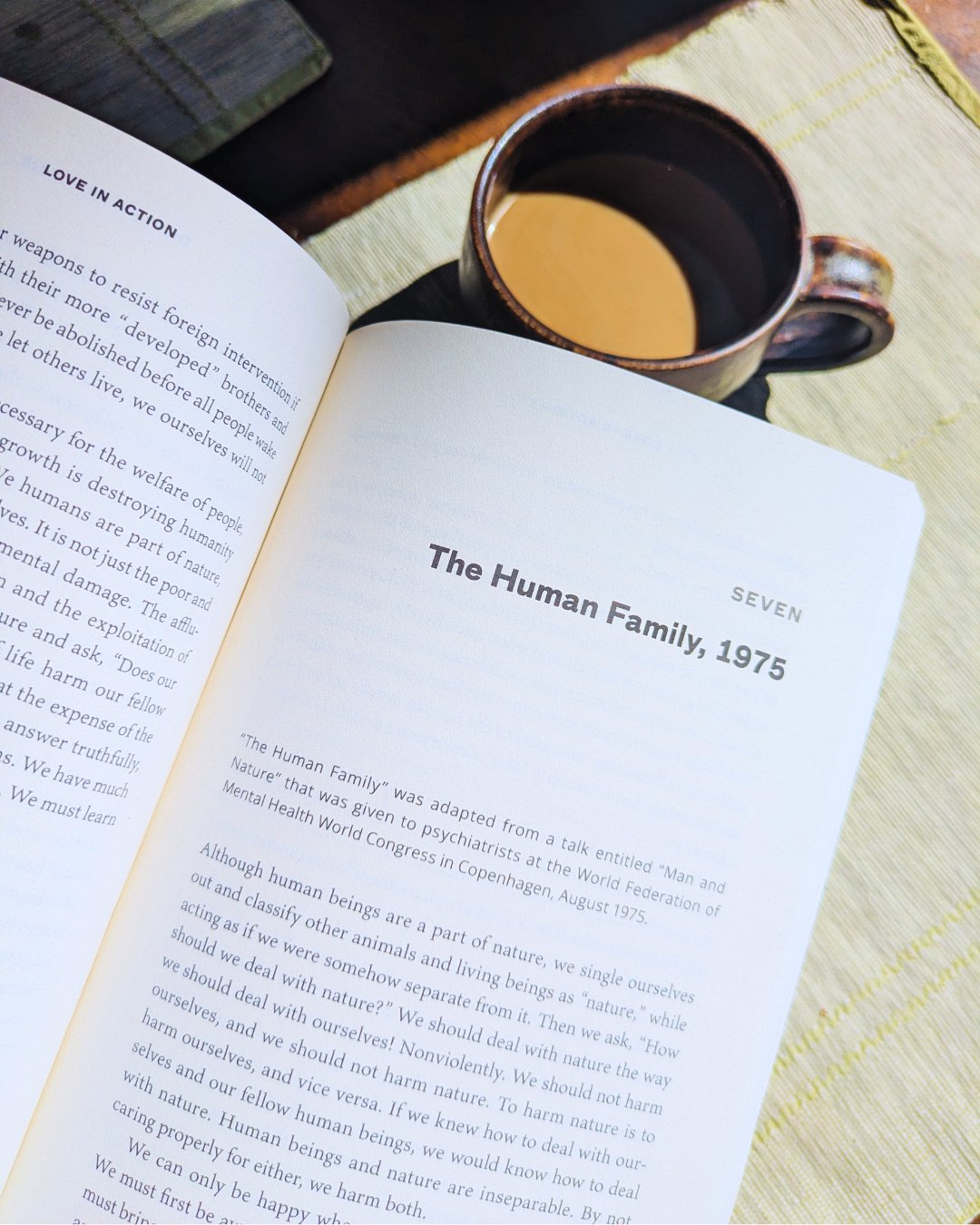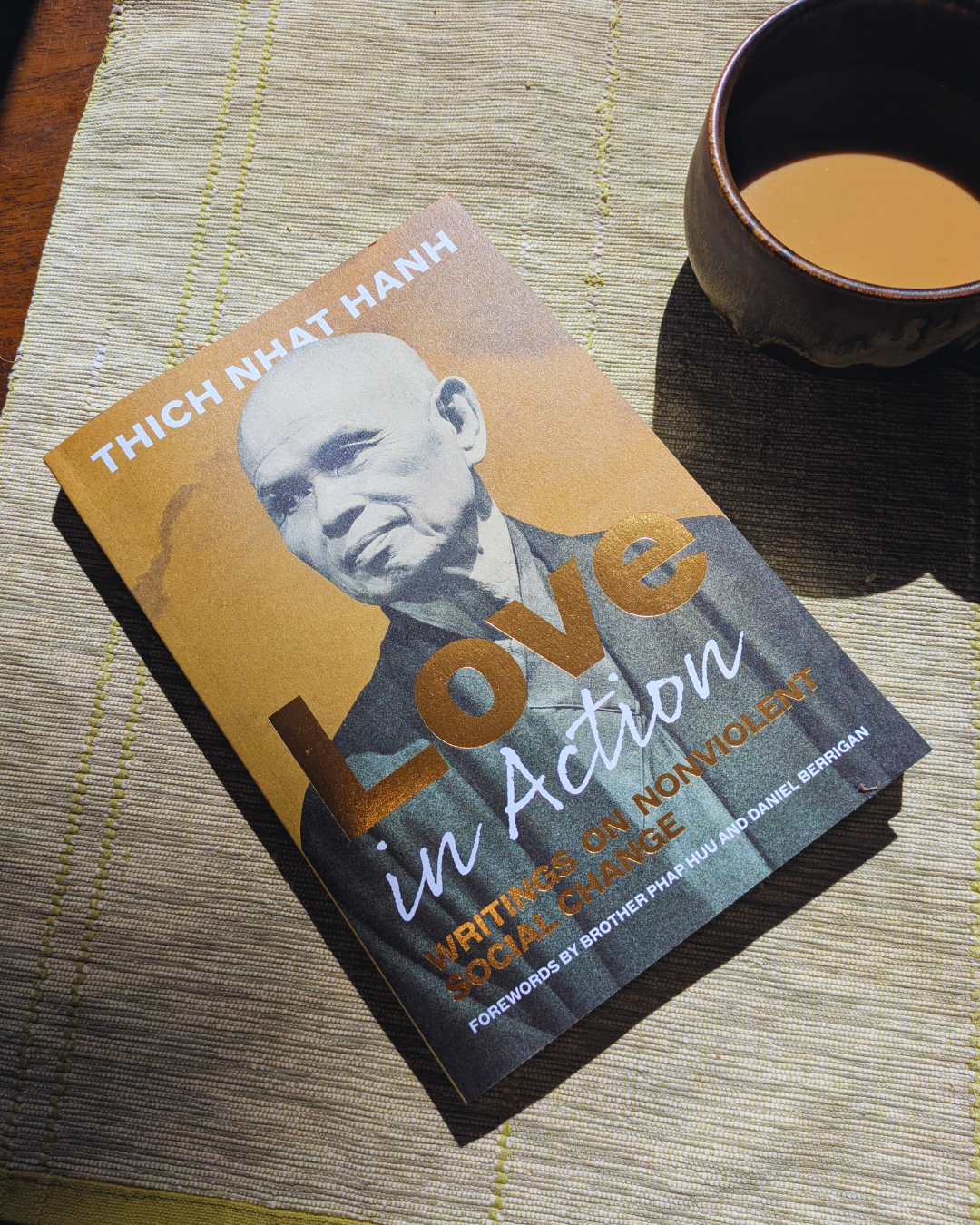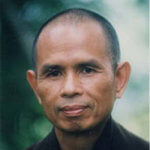An excerpt from Love in Action, a new collection of Thích Nhất Hạnh’s writings on nonviolent social change.
By Thich Nhat Hanh on
“The Human Family” was adapted from a talk entitled “Man and Nature” that was given to psychiatrists at the World Federation of Mental Health World Congress in Copenhagen, August 1975.
Although human beings are a part of nature,
An excerpt from Love in Action, a new collection of Thích Nhất Hạnh’s writings on nonviolent social change.
By Thich Nhat Hanh on
“The Human Family” was adapted from a talk entitled “Man and Nature” that was given to psychiatrists at the World Federation of Mental Health World Congress in Copenhagen, August 1975.
Although human beings are a part of nature, we single ourselves out and classify other animals and living beings as “nature,” while acting as if we were somehow separate from it. Then we ask, “How should we deal with nature?” We should deal with nature the way we should deal with ourselves! Nonviolently. We should not harm ourselves, and we should not harm nature. To harm nature is to harm ourselves, and vice versa. If we knew how to deal with ourselves and our fellow human beings, we would know how to deal with nature. Human beings and nature are inseparable. By not caring properly for either, we harm both.
We can only be happy when we accept ourselves as we are. We must first be aware of all the elements within us, and then we must bring them into harmony. Our physical and mental well-being are the result of understanding what is going on in ourselves. This understanding helps us respect nature in ourselves and also helps us bring about healing.

If we harm another human being, we harm ourselves. To accumulate wealth and own excessive portions of the world’s natural resources is to deprive our fellow humans of the chance to live. To participate in oppressive and unjust social systems is to widen the gap between rich and poor and thereby aggravate the situation of social injustice. Yet we tolerate excess, injustice, and war while remaining unaware that the human race as a family is suffering. While some members of the human family are suffering and starving, for us to enjoy false security and wealth is a sign of insanity.
The fate of each individual is inextricably linked to the fate of the whole human race. We must let others live if we ourselves want to live. The only alternative to coexistence is co-nonexistence. A civilization in which we kill and exploit others for our own aggrandizement is sick. For us to have a healthy civilization, everyone must be born with an equal right to education, work, food, shelter, world citizenship, and the ability to circulate freely and settle on any part of the Earth. Political and economic systems that deny one person these rights harm the whole human family. We must begin by becoming aware of what is happening to every member of the human family if we want to repair the damage already done.
To bring about peace, we must work for harmonious coexistence. If we continue to shut ourselves off from the rest of the world, imprisoning ourselves in our narrow concerns and immediate problems, we are not likely to make peace or to survive. It is difficult for one individual to preserve harmony among the elements within themselves, and it is even more difficult to preserve harmony among the members of the human family. We have to understand the human race to bring it into harmony. Cruelty and disruption destroy the harmony of the family. We need legislation that keeps us from doing violence to ourselves or nature and prevents us from being disruptive and cruel.
We have created a system that we cannot control. This system imposes itself on us, and we have become its slaves. Most of us, in order to have a house, a car, a refrigerator, a TV, and so on, must sacrifice our time and our lives in exchange. We are constantly under the pressure of time. In former times, we could afford three hours for one cup of tea, enjoying the company of our friends in a serene and spiritual atmosphere. We could organize a party to celebrate the blossoming of one orchid in our garden. But today we can no longer afford these things. We say that time is money. We have created a society in which the rich become richer, and the poor become poorer. We are so caught up in our own immediate problems that we cannot afford to be aware of what is going on with the rest of the human family. We see images on TV, but we do not really understand our Third World brothers and sisters.
The individual and all of humanity are both part of nature and should be able to live in harmony with nature. Nature can be cruel and disruptive and therefore, at times, needs to be controlled. To control is not to dominate or oppress but to harmonize and equilibrate. We must be deep friends with nature in order to control certain aspects of it. This requires a full understanding of nature. Typhoons, tornadoes, droughts, floods, volcanic eruptions, and proliferations of harmful insects all constitute danger and destruction to life. Although natural, these things disrupt nature’s harmony. We should be able to prevent to a large degree the destruction that natural disasters cause, but we must do it in a way that preserves life and encourages harmony.
The excessive use of pesticides that kill all kinds of insects and upset the ecological balance is an example of our lack of wisdom in trying to control nature. Economic growth that devastates nature by polluting and exhausting nonrenewable resources, rendering the Earth impossible for beings to live on, is another. Such economic growth may appear to benefit some humans, but in reality it disrupts and destroys the whole of nature to which we all belong.
The harmony and equilibrium in the individual, society, and nature are being destroyed. Individuals are sick, society is sick, and nature is sick. We must reestablish harmony and equilibrium, but how? Where can we begin the work of healing? Would we begin with the individual, society, or the environment? We must work in all three domains. People of different disciplines tend to stress their particular areas. For example, politicians consider an effective rearrangement of society necessary for the salvation of humans and nature, and therefore urge that everyone engage in the struggle to change political systems.
We Buddhist monks are like psychotherapists in that we tend to look at the problem from the viewpoint of mental health. Meditation aims at creating harmony and equilibrium in the life of the individual. Buddhist meditation uses the breath as a tool to calm and harmonize the whole human being. As in any therapeutic practice, the patient is placed in an environment that favors the restoration of harmony. Usually, psychotherapists spend their time observing and then advising their patients. I know of some, however, who, like monks, observe themselves first, recognizing the need to free their own selves from the fears, anxieties, and despair that exist in each of us. Many therapists seem to think that they themselves have no mental problems, but the monk recognizes in himself the susceptibility to fears and anxieties, and to the mental illness that is caused by the inhuman social and economic systems that prevail in today’s world.
Buddhists believe that the reality of the individual, society, and nature’s integral being will reveal itself to us as we recover, gradually ceasing to be possessed by anxiety, fear, and the dispersion of mind. Among the three—individual, society, and nature—it is the individual who begins to effect change. But in order to effect change, the individual must have personally recovered, must be whole. Since this requires an environment favorable to healing, we must seek the kind of lifestyle that is free from destructiveness. Efforts to change the environment and to change the individual are both necessary, but it is difficult to change the environment if individuals are not in a state of equilibrium. From the mental health point of view, efforts to recover our humanness should be given priority.
Restoring mental health does not mean simply helping individuals adjust to the modern world of rapid economic growth. The world is sick: adapting to an unwell environment will not bring real health. Many people who seek the help of a psychotherapist are really victims of modern life which separates human beings from the rest of nature. One way to help such a person may be to move them to a rural area where they can cultivate the land, grow their own food, wash their clothes in a clear river, and live simply, sharing the same life as millions of peasants around the world.
For psychotherapy to be effective, we need environmental change, and psychotherapists must participate in efforts to change the environment. But that is only half their task. The other half is to help individuals be themselves, not by helping them adapt to an ill environment, but by providing them with the strength to change it. To tranquilize them is not the way. The explosion of bombs, the burning of napalm, the violent deaths of relatives and neighbors, the pressures of time, noise, and pollution, the lonely crowds—these have all been created by the disruptive course of our economic growth. They are all sources of mental illness, and they must end. Anything we can do to bring them to an end is preventive medicine. Political activities are not the only means to this end.
While helping their particular patients, psychotherapists must, at the same time, recognize their responsibility to the whole human family. Their work must also prevent others from becoming ill. They are challenged to safeguard their own humanness. Like others, psychotherapists and monastics first need to observe themselves and their own way of life. If they do, I believe they will seek ways to disengage themselves from the present economic systems in order to help reestablish harmony and balance in life. Monastics and psychotherapists are human beings. We cannot escape mental illness if we do not apply our disciplines to ourselves. Caught in forgetfulness and acquiescence to the status quo, we will gradually become victims of fear, anxiety, and egotism of all kinds. But if psychotherapists and monastics, through mutual sharing, help each other apply our disciplines to our own lives, we will rediscover the harmony in ourselves and thereby help the whole human family.
A tree reveals itself to an artist when the artist can establish a genuine relationship with it. If a human is not a real human being, they may look at their fellow humans and not see them; they may look at a tree and not see it. Many of us cannot see things because we are not wholly ourselves. When we are wholly ourselves, we can see how one person, by living fully, demonstrates to all of us that life is possible, that a future is possible. But the question “Is a future possible?” is meaningless without seeing the millions of our fellow humans who suffer, live, and die around us. Only when we really see them will we be able to see ourselves and see nature.

This is an excerpt from Love in Action by Thích Nhất Hạnh, published by Parallax Press.


